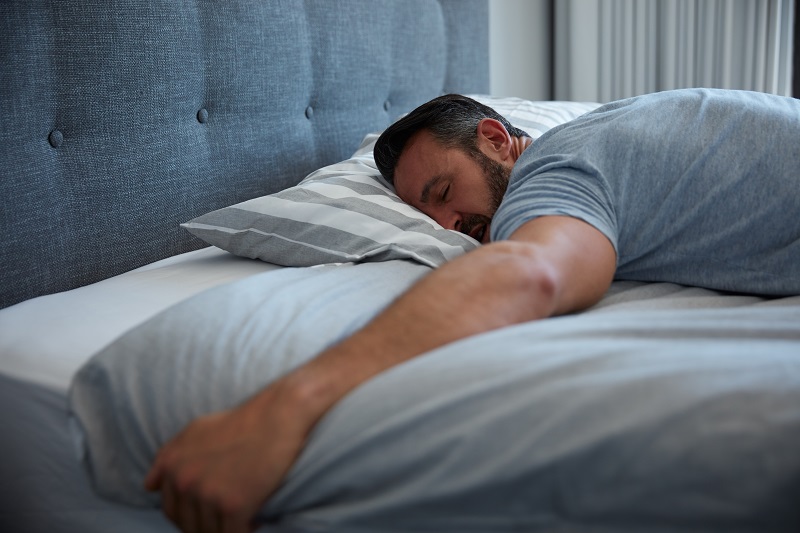Longer Sleep Periods May Help Prevent Development of Obesity
Conventional wisdom used to be that one’s weight is determined purely by nutrition and activity level. However, we now understand body weight to be more than simply a function of behavior. Genetics, socioeconomic status, community environment, stress, and overall health all play a role in one’s weight. Additionally, how well or poorly you sleep can affect weight gain and loss, as sleep loss is one of the risk factors for obesity.
A troubling concern for individuals with obesity is that not only does sleep loss lead to weight gain, but being overweight also causes sleep issues, which can, in turn, worsen biological processes that contribute to weight gain. It is a frustrating cycle, but help is available for people who are overweight or obese to improve sleep and the health effects associated with sleep loss.
How Does Sleep Deprivation Lead to Weight Gain?
Sleep loss creates a hormone imbalance in the body that promotes overeating and weight gain. Leptin and ghrelin are hormones that regulate appetite, and when you aren’t getting sufficient sleep, the production of these hormones is altered in a way that creates increased feelings of hunger. Sleep deprivation is associated with growth hormone deficiency and elevated cortisol levels, both of which have been linked to obesity. Additionally, insufficient sleep can impair your metabolism of food.
Unfortunately, the effects of sleep loss on weight are not limited to changes at the chemical level. Restricted sleep duration has been shown to cause a greater tendency to select high-calorie foods. Calories consumed late at night increase the risk of weight gain. Furthermore, adults who do not get sufficient sleep get less exercise than those who do, possibly because sleep loss causes sleepiness and fatigue during the day.
Childhood Obesity and Sleep
Children require more sleep than adults due to the important development taking place in their bodies and minds. Sleep loss in children increases their risk for becoming overweight or obese. In fact, children who aren’t sleeping enough may experience the same hormonal changes seen in adults that lead to weight gain. They could also experience increased daytime fatigue, leading to decreased activity levels.
Bedtime might also affect weight. One study found that children who went to bed later had worse diet quality, consuming more nutrient-poor foods and fewer fruits and vegetables than children who went to bed earlier.
Moreover, research has shown that among children who are overweight, those who sleep less and experience irregular sleep schedules are at the greatest risk for harmful health effects.
How Does Being Overweight Affect Sleep?
People who are obese are more likely to report insomnia or trouble sleeping than those who are not obese. There is also evidence to suggest that obesity is associated with increased daytime sleepiness and fatigue, even in people who sleep through the night undisturbed. Researchers suggest that obesity may change metabolism and/or sleep-wake cycles in such a way that causes sleep quality to deteriorate. It’s also possible that there are physical effects of carrying excess weight itself which impact sleep quality.
What Sleep Concerns Are Common in People Who Are Overweight?
Many health conditions can affect sleep, and some of them are found more often in individuals who are overweight or obese. The presence of one or more of the following conditions can compound insomnia and other sleep issues caused by obesity:
- Obstructive sleep apnea (OSA): OSA is a sleep disorder in which the airway partially or fully collapses, causing loud snoring and breathing issues at night. OSA is seven times more common in individuals who are obese. Weight not only affects one’s risk for OSA, but being overweight can increase the severity of OSA symptoms.
- Gastroesophageal reflux disease (GERD): GERD is a chronic condition in which the contents of the stomach leak into the esophagus, causing symptoms such as heartburn. Obesity is a known risk factor for GERD. Symptoms are often worse when lying down, and GERD may be associated with disturbed sleep.
- Depression: Obesity is associated with depression, and the two share a reciprocal relationship. In other words, obesity can cause or intensify depression symptoms, while depression can lead to weight gain. People with depression are also likely to suffer from sleep issues; insomnia occurs with depression up to 75% of the time.
- Asthma: Asthma is a respiratory condition involving inflammation of the airway. Obesity increases one’s risk for developing asthma and for experiencing worse asthma symptoms. Many patients with asthma experience nighttime symptoms, leading to difficulty falling and staying asleep.
- Osteoarthritis: Osteoarthritis is a joint disorder marked by worn down cartilage. Being overweight can cause osteoarthritis because of the strain additional weight places on the joints. Osteoarthritis affects sleep and may share a cyclical relationship with pain, depression, and disturbed sleep in which these conditions exacerbate one another.
How Can You Get Better Sleep When Overweight?
The term “sleep hygiene” means engaging in practices that support a good night’s sleep. This is important for everyone, but it’s especially critical if you are dealing with sleep concerns. Sleep hygiene involves things like setting a predictable sleep schedule, creating a bedtime routine, and engaging in healthy habits during the day. The following steps may be especially useful to consider when overweight:
- Exercise: Exercising may improve sleep quality in people suffering from sleep disturbances. It has also been shown to reduce symptoms in patients with OSA, independent of weight loss. Also, exercising outside exposes you to natural light, promoting a healthy sleep-wake cycle.
- Find a mattress that works for you: It’s important that your mattress allows for proper alignment of your spine and balanced contact pressure between your body and the mattress. Mattress preferences vary from one person to the next. Research has shown that body weight affects the type of mattress one may find most comfortable.
Select foods carefully: Diet and nutrition are also components of sleep hygiene, but sleep loss can make healthy eating more challenging. Taking steps to maintain a balanced diet may improve sleep. For example, researchers have found that a diet high in carbohydrates may decrease your ability to get deep sleep. Another study found that eating within 30 to 60 minutes of bedtime resulted in poorer sleep patterns.
The sleep loss-weight gain cycle can be a tricky one to break. It’s important to work with a doctor or involve a sleep specialist if you are experiencing poor quality sleep that could be related to weight. Weight loss may be recommended for some, but not all, patients. A medical professional can provide individualized guidance about how to best incorporate the approaches discussed above and may be able to suggest additional interventions.
Read my more blogs from here











